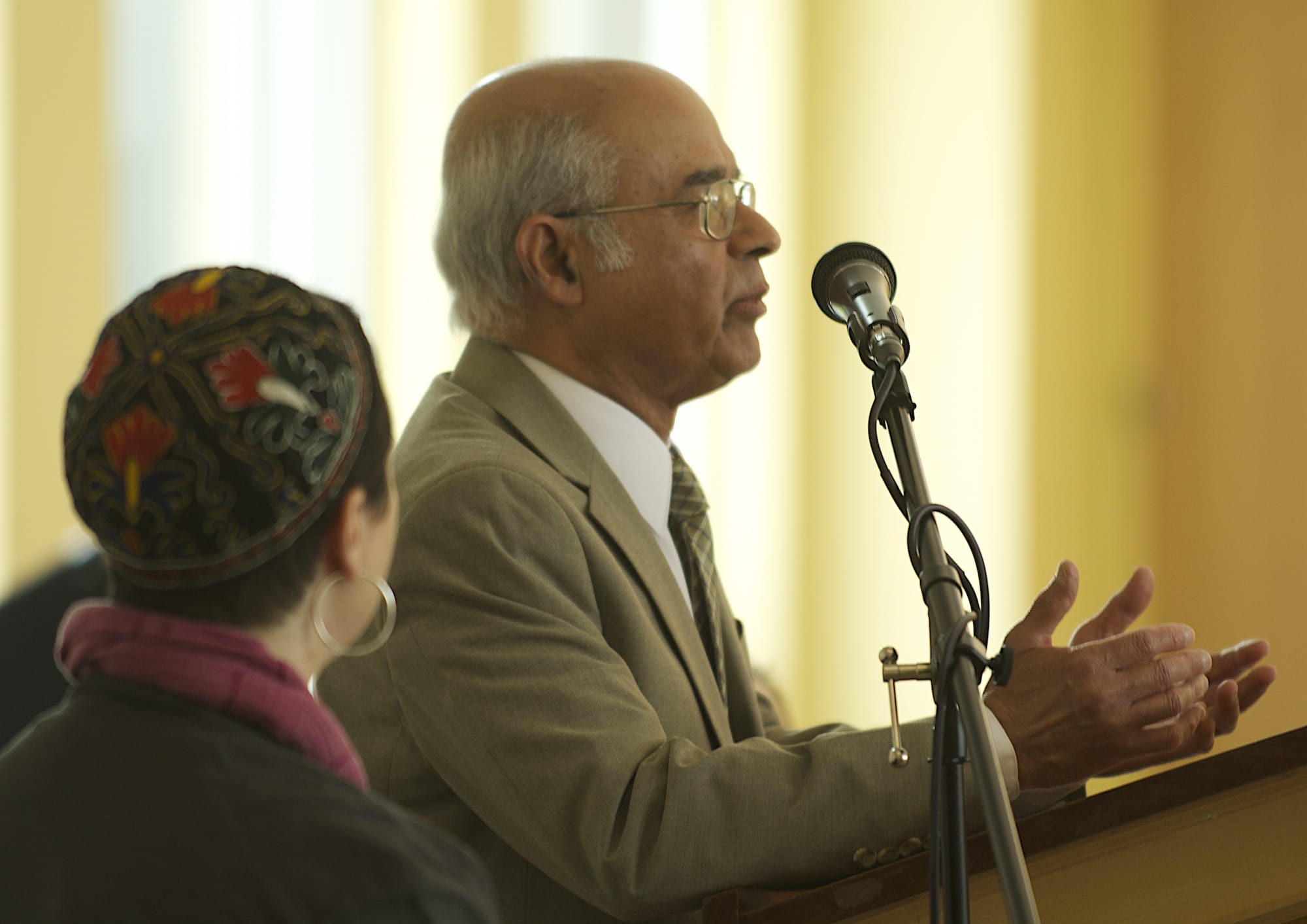The second annual prayer breakfast of Clark County’s progressive interfaith community focused on local issues and common projects.
The Port of Vancouver’s proposed oil-export terminal was the main topic on the table, with clergy from some of Clark County’s liberal-leaning faith communities citing scripture as they spoke in opposition to the plan. Approximately 50 people, both religious leaders and laity, attended the Thursday prayer breakfast at Congregation Kol Ami, the new Jewish temple in the Glenwood area of central Clark County.
Vancouver has been thrust upon the national stage in its soul-searching regarding the oil terminal plan, according to keynote speaker the Rev. Brooks Berndt of Hazel Dell’s United Congregational Church of Christ; we are the “choke point” not just for potential oil shipments, Berndt said, but for the whole question of American environmental stewardship, now and into the future.
“We are in a unique place to be called on this issue,” Berndt said.
Berndt emphasized more ways that local faith communities have taken action to address pressing local needs. The best example, he said, is the Winter Hospitality Overflow, or WHO — two Lutheran churches in Vancouver that open their floors to the homeless during the winter months when the weather gets nasty and regular shelters are full. The effort is staffed overnight, every night, all winter long, by volunteers from as many as 30 local congregations.
Berndt called the WHO program, which started in 2003, a “tremendous success” — and said he wants to build on it. How can faith communities move upstream from tending the homeless to influencing the policies that affect them? Berndt spoke out in support of a Vancouver “living wage” law that would index a local minimum wage to local housing costs.
Grass-roots efforts to bolster local minimum wages are underway in such places as San Francisco and Seattle, and President Barack Obama has suggested a nationwide minimum wage of $10.10. On Thursday, home health care workers rallied in Esther Short Park as part of a nationwide day of action in support of a $15-an-hour minimum wage.
Berndt said it’s “not rocket science” to deduce that low-paying jobs are a primary reason for poverty.
His comments were expanded upon by a panel of three other local clergy: Dr. Khalid Khan, founder of the Islamic Society of Southwest Washington; C. Wess Daniels of the Camas Friends Church; and Rabbi Elizabeth Dunsker of hosting site Congregation Kol Ami.
In addition to a variety of local congregations, the event was attended by people from nonprofit agencies including Share, Friends of the Carpenter and the Special Olympics.
Different voices
Dunsker has been a driving force behind this progressive interfaith clergy group, which meets monthly at Legacy Salmon Creek hospital. She came to Clark County in 2008 and quickly gathered that the religious atmosphere here is generally conservative Christian, she said — that, for example, the annual Clark County Mayors’ and Civic Leaders’ Prayer Breakfast and the annual all-church picnic both have a markedly evangelical Christian flavor.
“You would think the only religious voices in Clark County are right-wing voices,” she said. “That’s why we got this started, to pull together some other voices.”
Berndt echoed that; he began his talk by confessing that after being immersed in the black activist community in Oakland, Calif., Vancouver felt awfully complacent and white.
“There is something missing,” he wrote to his mentor, the Rev. Dr. J. Alfred Smith Sr., in a letter included in a book they co-authored about church activism called “Sounding the Trumpet.” What was missing, he said, were “active and robust struggles against injustice.”
In fact, the book traces Berndt’s successful effort to activate his congregation in such struggles. With gentle nudging, his group voted to work against childhood hunger; since then, it’s also worked toward marriage equality and tighter gun control laws.
Between those recent endeavors and the monthly meetings of this progressive clergy group, Berndt said he’s concluded, “I was too hasty and uninformed in my evaluation of Vancouver.”
Khan, who teaches mechanical engineering at the University of Portland, said an earlier progressive faith group, the Greater Vancouver Interfaith Association, had achieved some great things but then “fizzled out.”
Khan said there’s a “tiny” number of Muslims — under 2,000 — in Clark County. Muhammad, the prophet of Islam, was an orphan who always “had a soft spot in his heart for the downtrodden,” he said.
Khan didn’t say much specifically about the oil issue but mentioned that he had contributed an article about the Islamic view of the environment to a 1998 book by University of Portland faculty called “All Creation is Groaning: An Interdisciplinary Vision for Life in A Sacred Universe.”
Daniels, pastor of the Camas Friends Church, and Rabbi Dunsker both described tiny steps that nearly anyone can take to make the world a better place. Daniels talked about a homeless woman who turned up at his church a few years ago begging for a place to sleep; she provided his “crash course” in caring for the needy and about the local safety net. One outcome has been his church’s “Laundry Love” outreach effort that provides free washes for the poor twice a month.
“It’s so ridiculously simple. It’s fun,” he said. Plus, it costs little and creates community along the way, he said.
Dunsker recently shaved her head to raise money for pediatric cancer research — joining with a group of other rabbis around the nation and ultimately raising hundreds of thousands of dollars. Her young son, meanwhile, grew his hair into a gigantic, curly mane — and then donated it to another cancer charity.
“It’s so easy to care for each other in the smallest ways,” Dunsker said.




